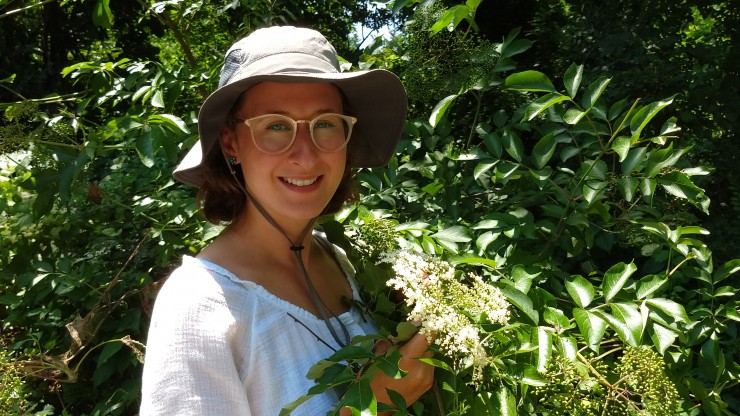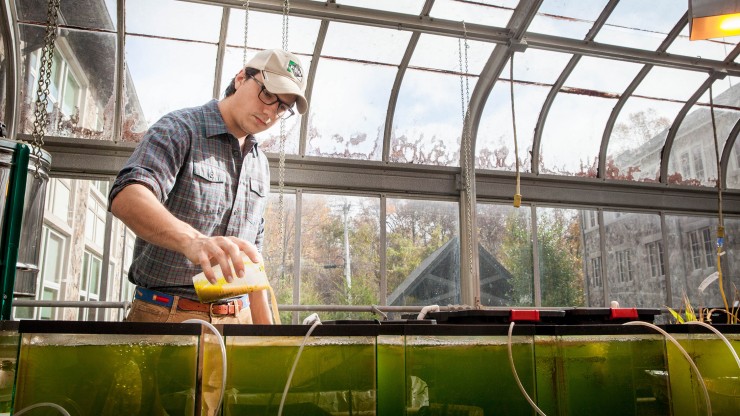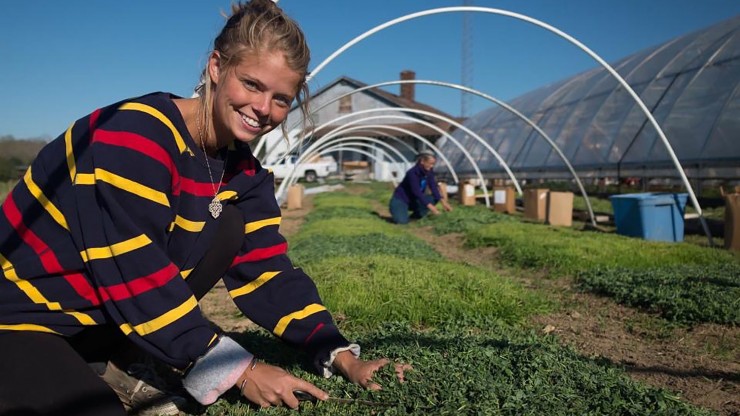We farm as though the future matters.
Deep Soil ~ Clean Food ~ Engaged Campus
By the numbers:
Rooted in education: Learn by doing. Come to the farm for labs, work-study, research and volunteer events.
Rooted in production: Harvest your own salad greens and eat them that same day in our dining hall.
Rooted in hope: Breathe easy. We can show you a path to a sustainable future where you can be an agent for change.

Growing Elderberries on the Cumberland Plateau
Alumna's VISTA project produces specialty crop data for local farmers.
Emily Heid, C'17, was a key player in the award of a USDA specialty crop block grant (SCBG) at the University Farm. Heid co-wrote the grant proposal, which enabled a partnership between the The University of the South Farm and 6 local farmers. The project established trial orchards in Marion, Franklin and Grundy counties that were observed and monitored for 3 years to determine the viability of the improved cultivars selected by the University of Missouri. While these varieties produce well in the Midwest, it wasn't known if they might be commercially viable here on the Cumberland Plateau.
Elderberry plantings of 5 different cultivars. “Bob Gordon,” “Adams,” “Wyldewood, and “Ranch” were compared to native plants from the Cumberland Plateau. The orchards were established across a range of conditions in 2019 and observed for 3 years. Each trial orchard consisted of 25 plants, 5 plants of each variety.
The best trial orchard achieved a harvest equivalent of 1.9 tons/acre of berries, which at 2021 prices is worth $7,600 when frozen or more than $20,000 when dried. "Ranch" was the best producing variety at that trial location. Several other trial orchards saw good fruit production but unable to harvest due to birds eating the berries as soon as they became ripe. The is full report is available via email from farm@sewanee.edu or by downloading the (PDF)

A Different Kind of Fish Farming
The University Farm explores an experimental aquaponics system to grow vegetables and save water on and beyond the Domain.
In the fall of 2016, Sewanee found itself in the clutches of one of the worst droughts the region had ever seen. Classified by the U.S. Drought Monitor as severe, the drought meant that soils at the University Farm suffered for lack of rain. “I was running my irrigation water all the time, just trying to keep plants that are in the field alive,” says University Farm Manager Carolyn Hoagland.
Fortunately, there was already a solution in the works. Hoagland had experimented with aquaponics for environmental sustainability at the farm before the drought arrived. And now, a little more than a year after the drought, the system has been refined in ways that could extend its use well beyond the Domain. The project, already involving Sewanee students and faculty members, stands to expand to surrounding counties, particularly to farmers looking for a greener alternative to traditional farming.
This is not your grandparents' farm.
LANDSCAPE FACTS
April is the month for cavorting and welcoming spring back to the Mountain. Our baby goats come to campus for goat yoga and for stress lowering petting sessions during reading days and exam week.
Work study students and student volunteers constructed our three solar-heated greenhouses. Come and experience a sunny, warm, growing environment in the middle of the winter. (There are still plenty of building projects happening here).
Almost all of produce grown on the University Farm is routed to campus dining halls and coffee shops. The remaining 10 percent is routed to local food banks and farmer’s markets.

Microgreen Thumb
One student’s novel research project explores a new growing strategy on the University Farm.
A bright spring day finds Brigid Lanigan next to the old University Dairy building near Lake Cheston, where a new 95-foot-long high-tunnel greenhouse was erected earlier this year. She crouches down and uses a pair of scissors to carefully cut rows of tiny plants that have been growing in an adjacent smaller greenhouse, which was built for her capstone research project. These tiny plants are “microgreens”—in this case soft red winter wheat and Austrian winter pea. Microgreens are grown and harvested in less than three weeks and can be cultivated from a variety of plants. They are used primarily in salads, soups, and juices. In a few days, once the clippings have dried, they will be weighed and sent to a lab to be tested for nutrient content.
A senior environment and sustainability major, Lanigan has an interest in soils and how they transfer nutrients to plants. While exploring soil-related topics for her capstone research project, she learned about “biochar,” a form of charcoal that is used to improve soil. Her advisor, Assistant Professor Russell Fielding, connected her with Sewanee’s farm manager, Carolyn Hoagland, who has a master’s degree in soil and crop science, and is pursuing a Ph.D. in microbial ecology. Hoagland and Lanigan devised a novel study to test the effects of applying biochar to soils used to grow microgreens.

